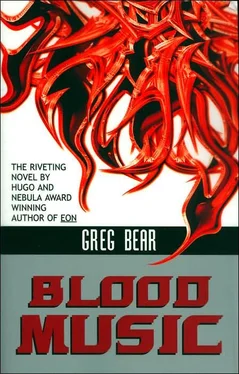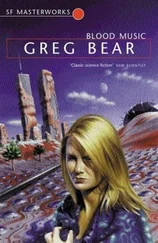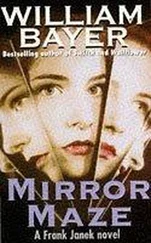Gregory Bear - Blood Music
Здесь есть возможность читать онлайн «Gregory Bear - Blood Music» весь текст электронной книги совершенно бесплатно (целиком полную версию без сокращений). В некоторых случаях можно слушать аудио, скачать через торрент в формате fb2 и присутствует краткое содержание. Город: New York, Год выпуска: 2005, ISBN: 2005, Издательство: ibooks, Incorporated, Жанр: Фантастика и фэнтези, на английском языке. Описание произведения, (предисловие) а так же отзывы посетителей доступны на портале библиотеки ЛибКат.
- Название:Blood Music
- Автор:
- Издательство:ibooks, Incorporated
- Жанр:
- Год:2005
- Город:New York
- ISBN:1596871067
- Рейтинг книги:4 / 5. Голосов: 1
-
Избранное:Добавить в избранное
- Отзывы:
-
Ваша оценка:
- 80
- 1
- 2
- 3
- 4
- 5
Blood Music: краткое содержание, описание и аннотация
Предлагаем к чтению аннотацию, описание, краткое содержание или предисловие (зависит от того, что написал сам автор книги «Blood Music»). Если вы не нашли необходимую информацию о книге — напишите в комментариях, мы постараемся отыскать её.
Blood Music — читать онлайн бесплатно полную книгу (весь текст) целиком
Ниже представлен текст книги, разбитый по страницам. Система сохранения места последней прочитанной страницы, позволяет с удобством читать онлайн бесплатно книгу «Blood Music», без необходимости каждый раз заново искать на чём Вы остановились. Поставьте закладку, и сможете в любой момент перейти на страницу, на которой закончили чтение.
Интервал:
Закладка:
Then who was to say they weren’t altering others, people with minor problems, people with all the complexes of little screw-ups and errors and temporary nastiness… things all humans have. Occupational hazards of being human. Of living in a tough universe, a different universe than the ones the noocytes inhabited. If they did correct and edit and alter, who could say they were good at it? Knew what they were doing, and retained workable human personalities afterward?
What did the noocytes do with people who couldn’t handle the change, who went crazy—or who, as was hinted, died incompletely assimilated, leaving partial memories, like Vergil’s partial in Bernard’s own body? Did they cull and weed here, too?
Was there politics, social interaction, in the noosphere? Were humans given an equal vote with noocytes? Humans had, of course, become noocytes—but were the genuine, the original noocytes more or less well regarded?
Would there be conflict, revolution?
Or would there be profound quiet—the quiet of the grave, because of a deletion of the will to resist? Not an important thing, free will, for a rigid hierarchy. Was the noosphere a rigid hierarchy, lacking in dissent or even comment?
He didn’t think so.
But could he know for sure?
Did they really respect and love humans as masters and creators, or did they simply suck them in, chew them up, digest the information needed and send the rest into entropy, forgotten, disorganized, dead?
Bernard, do you now feel the fear of Big Change? The completely different—sublime, or hellish—as opposed to the difficult, often hellish status quo?
He doubted that Vergil had ever thought these things out. He may not have had time, but even allowing him the time, Vergil simply did not think such things through. Brilliant in the creation, slovenly in the consideration of consequences.
Wasn’t that true of every creator?
Didn’t anyone who changed things ultimately lead some people—perhaps many people—to death, grief, torment?
The poor human Prometheuses who brought fire to their fellows.
Nobel.
Einstein. Poor Einstein and his letter to Roosevelt. Paraphrase: “I have loosed the demons of Hell and now you must sign a pact with the devil or someone else will. Someone even nastier.”
Curie, experimenting with radium; how responsible was she for Slotin, over four decades later?
Did Pasteur’s work—or Salk’s, or his own—save the life of a man or woman who ultimately went on to wreak havoc, to turn bad, to really and truly screw up? Undoubtedly.
And did the victims ever think, “Sue the bastard!”
Undoubtedly.
And if such thoughts were heeded, such questions asked, wouldn’t all parents slaughter their children while they slept in the cradle?
The old cliché—Hitler’s mother, aborting herself.
So confusing.
Bernard rocked back and forth between sleep and nightmare, coming down hard on the side of nightmare, and lifting up on another swing to a kind of ecstasy.
Nothing will ever be the same again.
Good! Wonderful! Wasn’t it all badly flawed anyway?
No, perhaps not. Not until now.
Oh, Lord, I am driven to prayer. I am weak and incapable of making these judgments. I do not believe in you, not in any form that has been described to me, but I must pray, because I am in dread, in unholy fear.
What are we giving birth to?
Bernard looked down at his hands and arms, swollen and covered with white veins. So ugly, he thought.
42
The food appeared on top of a waist-high, grayish spongy cylinder at the end of a high-walled cul-de-sac.
Suzy looked down at the food on the plate, reached out to touch the apparent fried chicken, and drew her finger back slowly. The food was warm, the cup of coffee was steaming, and it looked perfectly normal. Not once had she been served something she didn’t like, and not once had there been too much, or too little.
They were watching her closely, keeping track of her every need. She was being tended like an animal in a zoo, or at least that was the way she felt.
She knelt down and began to eat. When she had finished, she sat with her back to the cylinder, sipping the last of the coffee, and pulled her collar up. The air was getting colder. She had left her coat in the World Trade Center—or what the north tower had become—and for the past two weeks, hadn’t felt any need for it. The air had always been comfortable, even at night.
Things were changing, and that was disturbing—or exciting. She wasn’t sure which.
To tell the truth, Suzy McKenzie had been bored much of the time. She had never been much on imagination, and the stretches of rebuilt Manhattan she had traveled had not appealed to her much. The huge canal-pipes pumping green liquid from the river into the interior of the island, the slow-moving fan-trees and propeller-trees, the expanses of glassy-silver bumps, like collections of road reflectors, spread over hundreds of acres of irregular surface—none of these things had interested her for more than a few minutes. They had no relation to her. She could not begin to understand what they were for.
She knew it should all have been fascinating, but it wasn’t human, and so she didn’t much care.
People interested her; what they thought and did, who they were, how they felt about her and she about them.
“I hate you,” she said to the cylinder as she returned her plate and cup to its top surface. The cylinder swallowed them and lowered out of sight. “All of you!” she shouted at the walls of the cul-de-sac. She wrapped her arms around herself for warmth and picked up the flashlight and radio. It would be dark soon; she’d have to find a place to sleep, perhaps play the radio for a few more minutes. The batteries were weakening, even though she had played it sparingly. She walked out of the cul-de-sac and stared at a forest of fan-trees climbing a steep reddish-brown mound.
On top of the mound was a many-faceted black polyhedron, each facet sporting a silvery needle about a yard long. There were many others like it on the island. She hardly noticed them now. Walking around the mound took about ten minutes. She entered a shallow valley the length of a football field, its sides lined with gently curving black pipe as thick as her waist. The pipe vanished in a dimple at the end of the valley. She had slept in such junctions before. She walked to the end of the valley and knelt down near the depression. She ran her hands over the surface of the dimple; it was quite warm. She could lie here for the night, under the pipes, and be fairly comfortable.
The sky glowed brilliant purple to the west. The sunsets were usually orange and red, subdued; the horizon had never looked so electric.
She turned on the radio and pulled the speaker close to her ear. She had turned down the volume to conserve the batteries, even though she suspected that was ineffective. The short wave transmitter in England, ever-faithful, came on immediately. She adjusted the knob and hunched deeper under the pipes.
“…riots in West Germany have centered around the Pharmek facilities housing Dr. Michael Bernard, suspected carrier of the North American plague. While the plague has not yet spread anywhere in the world but North America, tensions run high. Russia’s sealed borders and…” The signal slid and she readjusted.
“…famine in Romania and Hungary, now in its third week, and no relief in sight…”
“…Mrs. Thelma Rittenbaum, noted Battersea psychic, reports that she has had dreams of Christ appearing in the middle of North America, raising the dead and preparing an army to march on the rest of the world.” (A shaky woman’s voice on a tape of poor quality spoke a few unintelligible words.)
Читать дальшеИнтервал:
Закладка:
Похожие книги на «Blood Music»
Представляем Вашему вниманию похожие книги на «Blood Music» списком для выбора. Мы отобрали схожую по названию и смыслу литературу в надежде предоставить читателям больше вариантов отыскать новые, интересные, ещё непрочитанные произведения.
Обсуждение, отзывы о книге «Blood Music» и просто собственные мнения читателей. Оставьте ваши комментарии, напишите, что Вы думаете о произведении, его смысле или главных героях. Укажите что конкретно понравилось, а что нет, и почему Вы так считаете.












